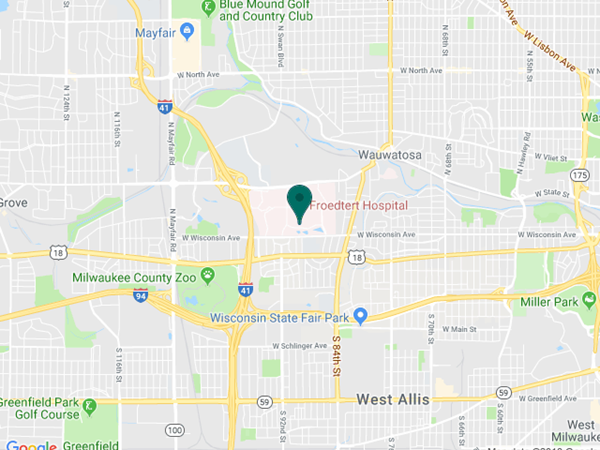Medical College of Wisconsin Colorectal Surgery Patient Information
The Colorectal Division has an expansive scope of services that includes the diagnosis and treatment of benign, inflammatory, functional, and malignant disease of the small bowel, colon, rectum and anus. The following is a list of some of what we offer:
- In-office and innovative operating room treatment for hemorrhoids
- Treatment of anorectal abscesses and non-sphincter cutting treatment of anorectal fistula
- Treatment of rectovaginal fistula
- Non-operative and operative treatment of anal fissure
- Surgical treatment of inflammatory bowel disease (Crohn’s disease and ulcerative colitis) with an emphasis on sphincter sparing and minimally invasive operative approaches
- Treatment of diverticular disease using laparoscopic techniques
- Diagnosis and treatment of fecal incontinence, rectal prolapse, and pelvic floor dysfunction including operative treatment of slow transit constipation
- Evaluation and management of patients and families with inherited colorectal cancer syndromes such as Hereditary Non-Polyposis Colon Cancer Syndrome (HNPCC) and Familial Adenomatous Polyposis (FAP)
- Operative treatment for colon cancer with an emphasis on the use of laparoscopic or minimally invasive surgical techniques
- Treatment of rectal cancer and polyps with a strong emphasis on multidisciplinary treatment, laparoscopic treatment, transanal endoscopic microsurgery and other transanal techniques and radical sphincter sparing operative and non-operative approaches
- Diagnosis and treatment of anal cancer and premalignant lesions of the anus and perianal tissues including use of high-resolution anoscopy
- Operative treatment of retrorectal or pre-sacral cysts and tumors
- Complex pelvic surgery
- In office anal and rectal ultrasound for benign and malignant disease
- Lower GI endoscopic services including anoscopy, proctoscopy, flexible sigmoidoscopy and colonoscopy
Clinical/Patient Care
The Division of Colorectal Surgery consists of five surgeons, three nurse practitioners, one physician assistant, and two registered colorectal nurse specialists who see patients at the Froedtert West Clinic, the Froedtert & the Medical College of Wisconsin Clinical Cancer Center, and the Froedtert Drexel Town Square Health Center. As a part of the only academic medical center in eastern Wisconsin, the Colorectal Surgery Program at the Medical College of Wisconsin is able to offer services that patients won’t find anywhere else.
New and ongoing initiatives include our Colorectal Cancer Program, our Anal Intra-Epithelial Neoplasia and High Resolution Anoscopy Clinic and our Inflammatory Bowel Disease Program.
The Colorectal Cancer Program is housed in the Faith Clinic at the Froedtert & MCW Clinical Cancer Center. In one clinic, patients with colon, rectal, small bowel and anal cancer can be seen and evaluated by the range of specialists that will or may be involved in their care: Colorectal Surgeon, Surgical Oncologist, Medical Oncologist, and Radiation Therapist. On a weekly basis, these specialists and dedicated body imaging Radiologists, Interventional Radiologists and GI pathologists take part in a Colorectal Cancer Multidisciplinary Tumor Board where cases are discussed and personalized treatment plans are formulated. For our rectal cancer patients, we emphasize accurate staging using rectal ultrasound and state of the art MRI imaging, use of neo-adjuvant treatment with chemotherapy and radiation therapy with the goal of improving cancer outcomes, maximizing the use of sphincter sparing techniques, treating patients with minimally invasive or laparoscopic techniques, and ultimately improving the quality of life for our rectal cancer patients. For our colon cancer patients, laparoscopic surgical techniques are emphasized. Patients with metastatic or advanced disease particularly benefit from a multidisciplinary approach since having all the right people in the same room, each bringing to the table their expertise and ideas, assures the best and most innovative treatment available will be offered.
Our Division is proud to be the only center in Wisconsin to offer specialized services for anal intra-epithelial neoplasia with high resolution anoscopy. We are using this clinical service not only as a means of diagnosis and treatment for patients affected by the human papilloma virus but also as a means to better understand how this virus can contribute to the development of anal cancer.
We continue to work with our Gastroenterology colleagues in treating patients with inflammatory bowel disease. Combined clinics, combined clinical rotations for our students and fellows, and a monthly case conference are all aimed at improving treatments and outcomes.
National Accreditation Program for Rectal Cancer

The NAPRC was developed through a collaboration between the Commission on Cancer (CoC), a quality program of the American College of Surgeons, and the Optimizing the Surgical Treatment of Rectal Cancer (OSTRiCh) Consortium, as well as the American College of Radiology (ACR), the American Society of Colon and Rectal Surgeons (ASCRS), and the College of American Pathologists (CAP). The NAPRC is based on successful international models that emphasize program structure, patient care processes, performance improvement, and performance measures. Its goal is to ensure that rectal cancer patients receive appropriate care using a multidisciplinary approach. For more information about the program, and instructions on how to apply for accreditation, please visit the NAPRC website, or contact NAPRC@facs.org.
To achieve voluntary NAPRC accreditation, a Rectal Cancer Program must demonstrate compliance with the NAPRC standards that look at Program Management, Clinical Services, and Quality Improvement. This includes establishment of a rectal cancer multidisciplinary team (RC-MDT) that includes clinical representatives from surgery, pathology, radiology, radiation oncology, and medical oncology. In addition, the program meets standards addressing the clinical services that the rectal program provides, including Carcinoembryonic Antigen (CEA testing), Magnetic Resonance Imaging (MRI) and Computerized Tomography (CT) imaging for cancer staging, and ensuring that a patient starts treatment within a defined timeframe. Rectal Cancer Programs seeking NAPRC accreditation must be accredited by the Commission on Cancer and undergo a site visit every three years to maintain accreditation.
Contact Colorectal Surgery
Clinic Address
Center for Advanced Care
Surgical Specialties Clinic
8900 W. Doyne Ave.
Milwaukee, WI 53226
(414) 955-5783
(414) 955-0087 (fax)
Medical College of Wisconsin
Division of Colorectal Surgery
8701 Watertown Plank Rd.
Milwaukee, WI 53226


